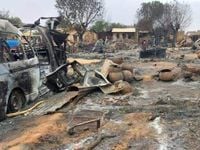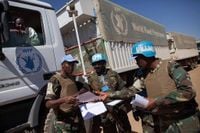The humanitarian crisis in Sudan’s Darfur region has taken a harrowing turn as a series of violent attacks and a devastating drone strike on a United Nations food convoy have deepened an already dire situation for millions of civilians. Since April 2023, Sudan has been gripped by a brutal power struggle between army chief Abdel Fattah al-Burhan and Mohamed Hamdan Daglo, the commander of the paramilitary Rapid Support Forces (RSF). This conflict has spiraled into a nationwide catastrophe, killing tens of thousands and displacing millions, while famine and disease spread unchecked.
The latest violence unfolded between August 11 and August 20, 2025, when the RSF launched what the United Nations described as “brutal attacks” on the besieged city of el-Fasher, the capital of North Darfur, and the nearby Abu Shouk displacement camp. According to Jeremy Laurence, spokesperson for the UN High Commissioner for Human Rights Volker Turk, at least 89 civilians were killed in these ten days—57 on August 11 alone, and another 32 between August 16 and 20. Laurence told reporters in Geneva, “Brutal attacks by the RSF … resulted in the killing of at least 89 civilians over a 10-day period up to August 20.” He added, “We fear the actual number of civilians killed is likely higher.”
Among the dead were members of the African Zaghawa tribe and at least one individual from the Berti tribe, raising fears of ethnically targeted violence. “This pattern of attacks on civilians and wilful killings, which are serious violations of international humanitarian law, deepens our concerns about ethnically motivated violence,” Laurence said, underscoring the gravity of the situation. Disturbingly, the UN reported that 16 of the most recent civilian deaths appeared to be summary executions.
El-Fasher holds particular significance as the military’s last stronghold in the sprawling Darfur region. The RSF has bombarded the city for over a year and, as of last month, imposed a total blockade on its estimated 300,000 remaining residents. The city is now surrounded, with the RSF controlling all other Darfur state capitals. The UN and rights groups have documented gross atrocities throughout the war—including ethnically motivated killings, rape, and attacks on displacement camps. The International Criminal Court is currently investigating alleged war crimes and crimes against humanity committed during the conflict.
Amidst this violence, the humanitarian situation has become catastrophic. On August 20, 2025, a drone attack destroyed a convoy of 16 trucks carrying desperately needed food to North Darfur. As reported by the Associated Press and confirmed by UN associate spokesperson Daniela Gross, “all drivers and personnel traveling with the World Food Programme convoy are safe,” but the trucks and their precious cargo were lost. Some reports indicated at least three trucks caught fire, while others stated that all trucks were destroyed. This was the second such attack in three months to prevent a UN convoy from delivering aid to North Darfur.
The warring parties have traded blame for the drone strike. The RSF accused the Sudanese army of targeting the convoy as part of a broader assault on the Mellit market and surrounding areas. The army denied responsibility, dismissing the accusation as a fabrication meant to distract from the RSF’s own alleged crimes. This back-and-forth has become a grim hallmark of the conflict, as both sides seek to shift blame for atrocities and attacks that continue to devastate civilian life.
The consequences of these attacks are felt most acutely by those trapped in el-Fasher and the surrounding region. The World Food Programme and UNICEF have repeatedly tried to deliver aid, but their convoys have come under fire. In early June 2025, another convoy was attacked while awaiting clearance to proceed to el-Fasher, resulting in five deaths and several injuries. According to Edem Wosornu of the UN humanitarian agency OCHA, about 70 trucks of supplies are currently stalled in the RSF-controlled city of Nyala, unable to move forward without security guarantees. “Humanitarian staff and assets must never be a target,” WFP spokesperson Gift Watanasathorn emphasized, urging all parties to respect international humanitarian law.
As the violence rages, famine is spreading. The UN has declared famine in the Zamzam displacement camp in North Darfur, once home to over 500,000 people, and now emptied after repeated RSF attacks. The risk of famine has since extended to 17 areas in Darfur and the neighboring Kordofan region, west of Khartoum. Nearly 25 million people across Sudan are experiencing acute hunger, according to UN agencies. The current war has killed more than 40,000 people, forced over 14 million to flee their homes, and left some families so desperate that they are eating grass to survive.
Compounding the crisis, Sudan is grappling with a severe cholera outbreak. The World Health Organization reported on August 11, 2025, that all 18 states in Sudan have been affected, with 48,768 cases and 1,094 deaths so far this year. WHO spokesperson Christian Lindmeier described the situation as “a severe humanitarian and public health crisis,” driven by active conflict, mass displacement, and the collapse of basic services. Civilians face severe food shortages, rising malnutrition deaths, and severely limited access to healthcare. Cholera, an acute intestinal infection spread through contaminated food and water, can kill within hours if untreated—yet it is easily preventable and treatable under normal circumstances.
The political landscape remains equally fractured. In late June 2025, the RSF and its allies announced the formation of a parallel government in areas they control, primarily in Darfur. This move further complicates efforts to negotiate humanitarian access or a ceasefire, as rival authorities vie for legitimacy. International actors, including the United States, Saudi Arabia, and neighboring Egypt, have voiced alarm at the escalating hunger crisis and called for pauses in fighting to allow more aid to reach those in need. But so far, these appeals have done little to stem the violence or open safe corridors for relief convoys.
The siege of el-Fasher is emblematic of the wider tragedy unfolding in Sudan. The city’s estimated 300,000 residents remain cut off from vital supplies, surrounded by armed groups, and subjected to ongoing bombardment. Aid workers, too, are at risk, with repeated attacks making it nearly impossible to deliver food, medicine, or other essentials. As the International Criminal Court continues its investigations, the world watches with growing concern, but the suffering on the ground only intensifies.
For now, the people of Darfur face a grim daily reality: relentless violence, hunger, disease, and a future clouded by uncertainty. The destruction of yet another aid convoy is a stark reminder of just how fragile and perilous humanitarian operations have become in this war-torn region.





